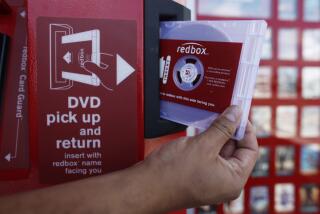Blockbuster Allies With Foes as Rental Era Winds Down
Running out of options to secure its future, the nation’s largest video rental company has decided to sleep with the enemy.
Blockbuster Inc. is joining forces with the very pay-per-view and video-on-demand outfits expected to obsolete the Dallas-based company.
In a massive redesign, Blockbuster hopes to turn its 7,300 video stores worldwide, 5,000 of them in the United States, into home entertainment supermarkets. The survival strategy: Serve customers whatever programming they want, when and however they want it. Let the core videocassette business play out as the business moves to satellite and online.
Beginning next month, consumers will be able to walk into their nearest Blockbuster store to buy satellite TV systems as well as subscriptions to DirecTV pay-per-view services. By year’s end, some Blockbuster customers also will get movies sent directly into their homes through high-speed digital subscriber lines via Enron Broadband Services Inc.’s Enron Intelligent Network.
Wall Street has labeled the video industry a loser, and these latest moves by Blockbuster haven’t changed things. After the Enron deal was announced July 19, Blockbuster shares rose to $11 after months of hovering in the $9-per-share range. The stock since has slid back. It dropped 50 cents Tuesday to close at $8.94 on the New York Stock Exchange.
When Viacom Inc. spun off an 18% stake in Blockbuster, the stock came out of the gate last August at $15 a share. Except for a brief period late last year, it has traded significantly below its offering price despite fairly regular double-digit gains in same-store sales.
This month, Blockbuster scrapped plans to take its online division public. The company said its video-on-demand deal with Enron would achieve the same goal of delivering movies to consumers via the Web.
Blockbuster Chairman John Antioco said his goal is to “transition Blockbuster from a retail-only powerhouse into a multichannel distributor of home entertainment at home.”
He added, “At worst, people could say it’s a good defense. But I believe it’s also an extremely smart growth opportunity for Blockbuster.”
Still, the chain will lose rentals with each satellite system they sell, said Blockbuster executives. Currently, the average video-renting customer adds $120 a year to Blockbuster’s gross profit. As those customers buy satellite systems, their rental activity is expected to be cut in half.
The extra revenue from DirecTV systems and service theoretically will more than make up the difference. Blockbuster projects that per-customer gross profit will rise next year to $145 and up to $175 the following year.
Antioco predicts that revenue could double during the next seven or eight years from the current $5 billion, about $4 billion of which now comes from video rental.
Blockbuster’s controversial strategy has other video retailers hopping mad. The Video Software Dealers Assn. has been lobbying studios for a longer exclusive video rental window before the pay-per-view run. The association cites its 1998 study showing 51% of consumers who subscribe to pay-per-view reduce their video rentals.
The Blockbuster On-Demand service, scheduled to launch in two major markets this year before an international roll-out beginning in 2001, not only undermines those negotiations but also is potentially damaging to other video rental companies.
The service allows consumers to choose from a large library of movies through their TV screens and enjoy full VCR-like control, meaning they can pause, rewind and stop films with the click of a button. It mimics the video rental experience without a trip to the video store.
Overall consumer spending on video rental, meanwhile, is expected to grow only slightly, chiefly because of DVD.
“I think the potential for the pay-per-transaction movie business--video rental, pay-per-view and video-on-demand--is enormous,” Antioco said. “I look at this as all one business. Essentially, the consumer is paying a price to see a movie once at home.
“And I believe that over the next seven or eight years, this business has the opportunity to double to $20 billion a year,” Antioco said. “You put a movie within arm’s reach of every American, and you get increased transactions.”
In addition to the DirecTV and Enron deals, Blockbuster in January announced a partnership with Metro-Goldwyn-Mayer Inc. to develop an Internet system for streaming and downloading the studio’s films.
Also in January, Blockbuster entered into an alliance with “personal-television” creator TiVo Inc. to develop a video-on-demand-like service that will enable TiVo subscribers to get Blockbuster movies for their TiVo receivers.
“I think [these deals are] crucial, in the grand scheme of things,” said Tom Adams of Adams Media Research in Carmel Valley, Calif. “Over the next 20 years, the delivery of Blockbuster’s core product is going to go electronic. Everybody’s got their own view of to what degree or how fast, but nobody disagrees this is going to happen.”
“It makes all kinds of sense,” said David Reidel, president of equity research for Salomon Smith Barney in New York.
“Clearly, they’ve been the leader in renting VHS tapes and DVD, and now, through their partnerships with DirecTV, TiVo and Enron, they’re going to have all their bases covered, no matter what technology emerges as the primary way for consumers to get entertainment into their homes.”
The deals also represent a lucrative way to leverage the vast Blockbuster database, Reidel said. “They have 65 million customers and their viewing preferences, so they can customize and tailor-make their product offerings,” he said. “It’s a pretty unique database, and it’s something even the studios don’t have.”
Thomas K. Arnold is editor in chief and associate publisher of Video Store Magazine.
(BEGIN TEXT OF INFOBOX / INFOGRAPHIC)
Desperate Deals
An uncertain future at Blockbuster Inc. mandates a radical new strategy. To survive, Chairman John Antioco, right, is joining forces with competitors.
*
Monthly closes and latest since going public a year ago
Stock price
Tuesday: $8.94
*
Revenue (Sales and rentals, in billions)
*
1999: $2.94 billion
Sources: Video Store Magazine; Bloomberg News
More to Read
The biggest entertainment stories
Get our big stories about Hollywood, film, television, music, arts, culture and more right in your inbox as soon as they publish.
You may occasionally receive promotional content from the Los Angeles Times.










